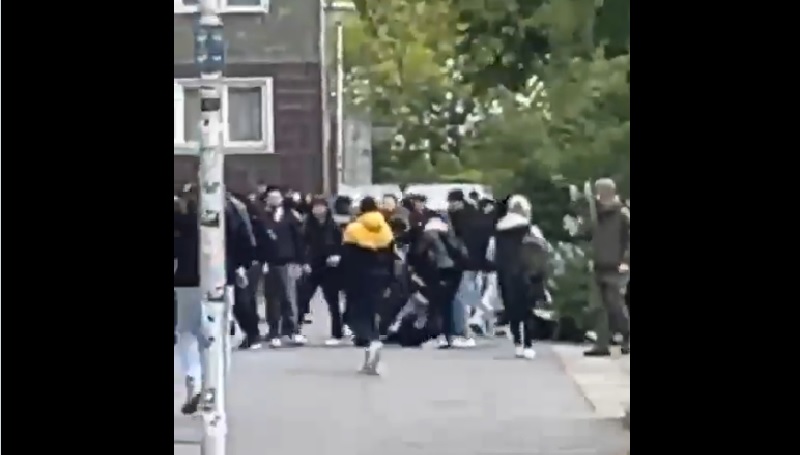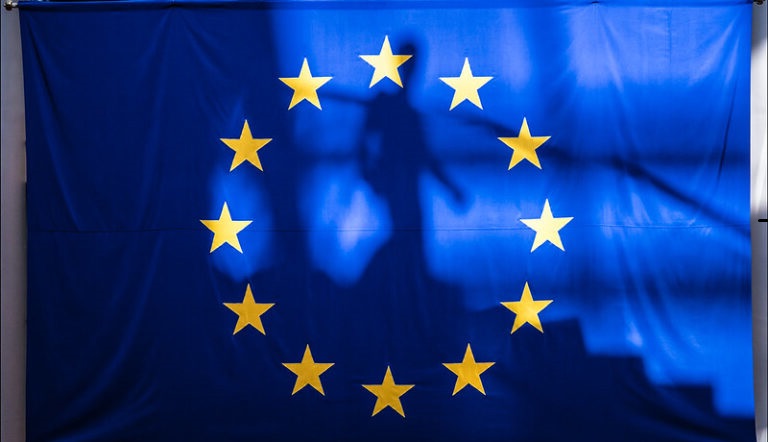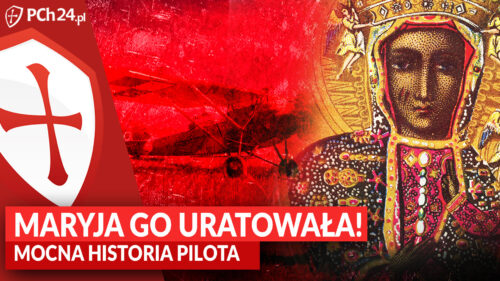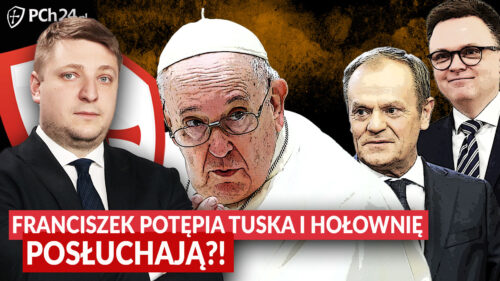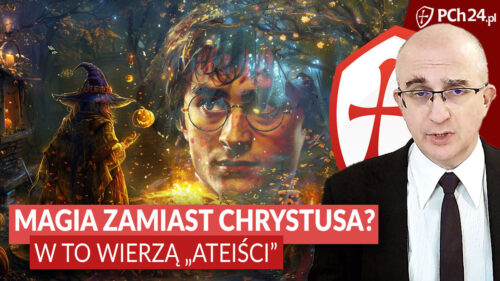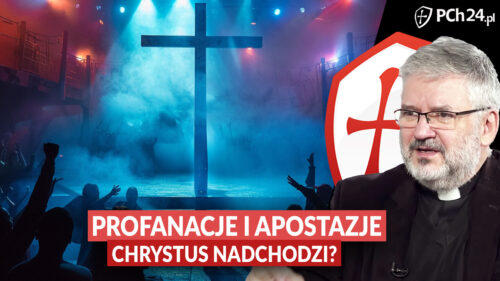We present You extraordinary inteview for PCH 24. During the Synod on Young People cardinal Leo Raymond Burke talked to Krystian Kratiuk about many issues important for contemporary Church.
Praised be Jesus Christ! Today we have a particular honor of being in the apartment of His Eminence Cardinal Leo Burke who is well known to our audience.
Wesprzyj nas już teraz!
Your Eminence thank you for your time, for your time for our Polish viewers. I would like to start our conversation asking a question about a very difficult topic. It is the great scandal of sexual abuse in the Church nowadays. We know that there was such a situation in your country, in the USA. What will be the future of the Church in your country? We have heard that there is a great division among the bishops, especially after the publication of the letters of Abp. Viganò. What is the future of the Church in the USA?
It’s going to be a difficult future in the sense that the people rightly feel profoundly betrayed when they see that a priest, who had been abusing young people, was not only promoted to be a bishop, then promoted to be a bishop of a diocese and archdiocese, and then of the archdiocese that is our national capitol, and then made a cardinal. And everybody knows now that it was known by certain people in the Church that that man was an abuser and yet they covered it up and promoted him. And this has to stop, this can’t be. I believe that if the proper canonical measures are taken, that the accusations that have been made are thoroughly studied and decisions are made regarding the truth of these accusations and that those who are responsible are properly sanctioned and that the people will slowly have their faith restored. But anyway there is an attempt to simply… not to (…), not to take it seriously, and the people, who are good Catholics are not accepting this and I don’t blame them, I don’t accept it either.
In this sad case there is something that is difficult to comprehend. Many people after the scandal would like to destroy the hierarchical Church because their logic is like this: If there are a few guilty bishops, guilty of a great sin, of something terrible, so we have to abolish the hierarchy of the Church. Is it a good way of thinking? Would the Church without its hierarchy be still a Catholic Church?
No, it would not. And that’s not a good way to think. Because we see from the first pages of the Gospel that Our Lord constituted that His Church’s hierarchical. He called a party of Twelve and placed them as heads and shepherds of the Church in his own person through the sacrament of Holy Orders. And because some bishops have betrayed grievously their office, that doesn’t mean that the hierarchical Church is at fault at all. And what needs to be done is not to treat this matter in some kind of a secular way and say: Well, the bishops didn’t do their jobs and now we simply eliminate the bishops and take over their responsibility. No, the way is to appoint good bishops and then make sure that our seminaries are as sound as possible so that good priests are ordained to that some of whom will eventually be called to be bishops.
Why is the Church hierarchical? Why isn’t it democratic? Because there are a lot of people, also in our country, in Poland, so called liberal Catholics etc., who say: No, the style of ruling in the Church is too old.
The reason that the Church is hierarchical is because it’s constituted by God. The constitution of the Church is given to us by Our Lord himself and this is a divine gift. So we can’t pretend that we’re going to reconstitute the Church by some kind of a constitutional assembly or by some kind of human project, but we have to conform ourselves to the will of God. And safeguard and promote the hierarchical nature of the Church. That’s the way for us to go.
I have to ask about the homosexual aspect of the great crisis in the USA but of course not only in the USA. There have also been some cases in our country, in Poland. And we know that Ireland has been touched by this problem. It isn’t easy to be a Catholic nowadays in the Church. The liberal media would like us to think, and also some Catholic media would like us to think that the greatest problem is clericalism and not the homosexual culture. Cardinal Grocholewski has said to the Polish media that that homosexual culture is one of the greatest problems in the Church and that it can be a reason for the sexual abuse scandal. Do you agree with that?
I agree completely with him. There is no question that the majority of the acts which have been committed are homosexual acts done with young men. And somehow this kind of egregious morale fault has been protected and in some way even promoted. And so we have to address the fact that there are priest who have these tendencies and are acting upon them. What happens is that, when you say this, people – and it has happened to me personally – people say: You’re saying that people with the same sex attraction are always abusing children. No, I’m not saying that. I’m saying that the priests who have abused children have done it by way of homosexual acts with young men. And that means that the moral character of our seminarians and priests in some way is not what it should be. Today there is a big confusion in the Church and certainly in secular society that if you say that homosexual acts are evil – which they are always and everywhere – that you’re hateful towards people who have homosexual tendency. This is absolutely false. St. Augustine used the formula – Our Lord himself shows us this in the Gospel: We love the sinner, we care with our heart for the sinner, but at the same time we hate the sin. And the way we love the sinner is by making clear that the sinful acts are evil and must be stopped. And so the other way the real issue is not addressed. To say that it is a question of clericalism I think is a way of avoiding a big difficulty that we have. This is not the first time in the Church that there was this difficulty. And Peter Damian had to write the whole treatise on the question of homosexual conduct in his time. First of all when people say: “Oh, no, this is caused by clericalism”, I ask them: What do you mean? And most people can’t tell me what they mean by clericalism. It would be clericalism that would protect or even promote priests who are doing evil things, yes. But the evil acts themselves don’t come from clericalism. And most of the priests with whom I have had contact during my years – priest and bishops who have sadly committed those acts – it wasn’t done through some kind of clerical mentality. They simply had an amoral weakness and it wasn’t properly corrected and they didn’t use the proper spiritual means to remain chaste and perfectly continent.
Maybe people think about clericalism because in our modern world anticlericalism is so strong, isn’t it?
Yes, this is why people say: No way, we don’t want to hear anymore what the priest has to say because they are all corrupt, they are all hypocrites. But the priest, the good priest – and there are many, many good priests – are simply teaching what Our Lord himself teaches in His holy Church and that for us is our way to happiness in this life and to eternal salvation. And so we need to avoid this kind of attitude which begins to be hostile to the clergy. Because the clergy are our shepherds and we need to love them and listen to them. And if someone is not worthy we need to confront that priest and say to him: What you’re saying to me I believe is false. So we need to demand from our priests and bishops that they present to us our Church’s true teaching and discipline.
This issue of homosexual abuse and abuse scandal is connected with the LGBT lobby in the nowadays world and in the nowadays Church. We know that during the Youth Synod the LGBT agenda was mentioned and it was in the Instrumentum Laboris of this Synod. Your Eminence, do you think it is appropriate, especially at the time of the homosexual abuse scandal?
No, it’s completely inappropriate. First of all this terminology comes from an aggressive homosexual lobby, it comes from a group who do not accept the Church’s teaching with regard to chastity, with regard to sexual morality, with regard to homosexual acts. And it’s a group which is aggressive in a sense that it seeks to influence very strongly children and young people and lead them into a great confusion. And so this type of language should never be in a Church document, and the Church must be very careful not to identify with this movement. I’ll go back to what I’ve said: the Church loves people, also those who can be aggressive in promoting evil. But at the same time because of our love for those people the Church is also militant in teaching the truth about our human sexuality and about the appropriate ways in which it expresses itself.
Does the Church have enemies? I have to ask about it because I’ve heard here in the Vatican that the times when the Church opposed the world and the world opposed the Church are over. And now we all live together and only in friendship etc. But I’m sure that there are still enemies outside the Church. And isn’t it a role of Catholics, and Catholic priests and journalists to say that the Church is not safe in the modern world?
Absolutely! I think Satan couldn’t be happier than have us think that the enemies of Christ have all gone away and that the enemies of His Church have all gone away. I would say that at present times those enemies are probably as ferocious or even more ferocious than they have ever been. We see it everywhere. We see it in the attack on human life, we see it in the attack on the integrity of marriage, we see it in the attempt to deny people the freedom to follow their own conscience in moral matters. So no, we… today… In fact when I was growing up we talked about the Church, the communion of saints in three bodies: in the Church glorious, the saints in Heaven, the suffering Church, the poor souls in Purgatory, and those of us here on earth we call the militant, in other words those who have to fight against the forces of evil in order to share with Christ in His victory, to be part with Him in His sufferings for the sake of salvation of the world. But I think that the idea that the Church has no more enemies is really diabolical. Now if we take this situation the attempt to have a kind of agreement with China and there is no question that the Chinese government is absolutely hostile to the Catholic faith and any Christian faith and they want to destroy it. In China the religion is China. To us to think that we can make some kind of treaty with the country which has at its very foundation a complete hostility towards the Catholic Church, well at best is naïve, but at worst it’s diabolical. Because we’re denying the existence of the enemy and actually trying to make compromises with the enemy and that is unacceptable. It becomes even more painful when one thinks that for decades faithful Catholics, all sorts of Catholics in China who were faithful to the Church and to the See of Peter were in prison and subjected to a cruel kind of torture, many died, many were martyrs and now it seems that all of that was meaningless. I mean this is a really serious matter but I chose it as an example simply to say: No, the Church has enemies and they are great enemies. And I think, too the world of freemasonry and this whole movement toward the one world government and those multimillionaires and multibillionaires who spend millions of dollars to destroy the moral in the nations like Ireland and try to influence also good nations like your own in Poland, to promote an agenda against life, against the family, against the Church.
They’ve destroyed Malta, they’ve destroyed many areas in the USA, they’ve destroyed Ireland – do you think Poland will be the next step in this antichristian revolution?
I think it’s certainly a target and I’m sure a very important target right now. And I pray with all my might because of that kind of Catholicism I’ve known in Poland that the Polish will not give in to this but the important think is to avoid a secular attitude, a worldly attitude that what I care about is material things and to realize that the greatest gift you have is the Catholic faith. And I think the Polish have that sense yet, and I think that there’re people who have been negatively influenced by the secular culture but I find so many Poles who have a deep sense of the Catholic faith and that this is the greatest gift. And now is the time to really fight for your Catholic faith.
I’d like to ask you one more question about the Youth Synod. I think that this is a synod at the new time for the Church, the time of synodality, which the issue is now present in the Church and in the final synod document as I’ve heard. Do you think that this synodality, synodalization of the Church could be treated by someone as a kind of democratization?
Yes, in fact it can easily lead to the situation of national Churches and a very kind of protestant approach to the Body of Christ in that sense that any little group who has a certain approach to the teachings and discipline of the Church has its own integrity and that there is no longer any unity which only constituted St. Peter as the head of the apostolic college. The See of Peter is the foundation, the principle foundation and defense of the unity of the bishops and of the faithful and the Catholic Church has never been able to [come to terms with?] national Churches, and we have examples of Gallicanism, Josephinism and so forth. And it’s always been to the harm of the Body of Christ. And so we need to have today more then ever an appreciation for the primacy of Peter and of the See of Peter. And there are two areas in particular that I would like to underline, and they were underlined at the time of the reform of the Church’s discipline and her Code of Canon Law. And that is the secret Liturgy. And the secret Liturgy because it is Christ himself who is coming to act and to give us grace through the sacraments and that has to be governed universally, we can’t have the possibility that some people are celebrating the Eucharist according to the true Catholic faith and that there are others who are celebrating in a way inimical to that faith. The other area is the Church’s discipline, especially her procedural law. The processes that are used in the Church to safeguard the sacred realities and to correct abuses have to be uniform throughout the Church. So I view it with a great deal of concern. The notion of synods has always existed in the Church, but the synod was a tool used by a bishop or an archbishop to see how better to teach the Church and how better to apply the Church’s discipline. It was never seen as a body that was creating a new teaching or a body that was creating a new discipline. And so there is a fundamental misunderstanding here that needs to be corrected.
We’ve heard from lots of priest at this synod that they are here to listen to the young people and not to teach them but to learn from them. Isn’t there a separation between the ecclesia docens and dicens?
That’s a mistaken, a completely mistaken idea. Yes, we need to listen to the young people in order to understand whatever challenges which they are facing. But the young people have the right to hear from us, from the Church, from their pastors, from their parents, from those who are adults, they have the right to hear from us the truth so that they can order their lives accordingly. The young people that I meet what they want most of all is that the Church teach clearly and strongly. And they are not interested in all this kind of approach that everyone feels good and every young person’s idea no matter what it is has the same weight as for instance the words of Christ himself. This is ridicules.
I know that there was in Poland a great example of a priest who was in rapport with the young people but the young people wanted to listen to him and to learn from him. It was of course Pope John Paul II.
Oh, yes…
This year we’ve had the 40th anniversary of his election to the See of Peter. Do you think that his moral teaching or social teaching is still valid in the Church?
Absolutely. In fact in the encyclical Caritas In Veritate on social justice Pope Benedict XVI said something with which I absolutely agree. And he said: we need today to take up once again Pope John Paul II’s encyclical letter Veritatis Splendor and the fundamental moral teaching of the Church because it is a light for us to deal with so many grievous moral problems that are in the world and in the Church. There is no question that Pope John Paul II was particularly gifted by God as the teacher of the faith and as far as I’m concerned he should be patron saint of the Synod on the Youth. Who more was a pope for the youth than Pope St. John Paul II? And how effective he was! I used to see him in the United Stated when he was a visitor and in another context and he always spoke to the young people with great love and great clarity and that’s what we need today. We need it, the poor young people but also older people who are not that well catechized and they don’t know the fundamental principles of the moral law and moral action. And those have to be taught again. And Veritatis Splendor is an excellent example and excellent teaching in that document. And of course Evengelium Vitae and the whole body of Pope St. John Paul II’s teaching.






